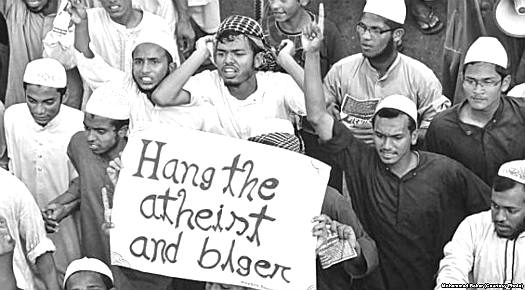
The problems for the non-religious community in Bangladesh for blogging continue into the present. The issue has been reported on since at least 2015. As noted in an old but not outdated article by Daylight Atheism, it reported on the problems ongoing in Bangladesh in 2015. There have been recent reports on the ways in which Bangladeshi activists, freethinkers, and humanists continue to be killed simply for exercising one or all of the following rights: freedom of expression or speech, freedom of (ir)religion), freedom of belief, and freedom of conscience.
In particular, the report pointed to the continuing murder of the atheists and freethinkers within the country at the hands of political Islam, or Islamist, followers: those who want to impose theocracy with use of violence, sometimes, fatal, and other means.
One person who died was Shahzahan Bachchu. He was assassinated earlier in June. Now, the Bangladesh government is doing nothing to protect the non-religious activist community against the outright murder of them, including people who have some leverage for providing a platform for voices, e.g. the publisher Bachchu.
The article stated, “Since Bangladesh’s government can’t or won’t protect its citizens, the only recourse I see for secularists is to leave the country. Thankfully, the International Humanist and Ethical Union (IHEU) is making this possible, there and elsewhere, through its Protect Humanists at Risk crowdfunding campaign.”
IHEU is an important and bright light in the work to expose theocratic overreach and abuse of citizens around the world. The campaign by IHEU is intended to provide support for the humanists at risk of violence.
Also, it is intended to help with advocacy and political campaigns for those who are at risk of governmental persecution. This can include blasphemy or apostasy laws. This is all included in a comprehensive research report entitled “Freedom of Thought Report.”
Bob Churchill and others are the brains behind this huge research project. The crowdsourced funding campaign is aiming to raise $26,000. In 12 countries, the penalty for a belief – in violation of the freedom to believe – or more an affirmation of atheism, is death.
This is based on so-called apostasy laws.
“In many more countries, ‘blasphemy’ laws are used to stop humanists promoting human rights, including women’s rights, LGBTI rights and non-religious rights, when they are accused of ‘insulting religion,’” the report explained. “In recent years, freethinkers have been attacked in countries including Pakistan, Bangladesh, Maldives and India. Humanists have been threatened with prosecution or violence in countries including Malaysia, Egypt, Afghanistan and Iran.”
The state has punished people for purported or alleged crimes including apostasy, the enmity against God, and the promotion of atheism. This has occurred in Iran, Pakistan, Saudi Arabia, and Sudan.
However, if one looks at nations including Bulgaria, Hungary, Moldova, Poland, Russia, Turkey, or the United States, some demagogues and ultra-conservative populist movements work to undermine both democracy and secularism.
In the process, this can harm the rights of the non-religious in general who really need secularism. IHEU may provide a bulwark against these regressions against and infringements on the rights of the non-religious around the world.
The Freethinker talked some more about it. It noted the fatalities connected to the threats against humanists and freethinkers. In 2015, the freethinking community lost Avijit Roy, Washiqur Rahman, Ananto Bijoy Das, and Niloy Neel.
There were coordinated attacks on publishing houses in October of 2015 in Dhaka. Secular activists and LGBT publishers continue to be victims too. Note, this seems clearly religious individuals killing secular people, humanists, freethinkers, and sexual orientation and gender identity minority people.
It does not seem to happen the other way around. However, and to conclude the report, the Prime Minister Sheikh Hasina stated that the attacks against the non-religious activists was because of the criticisms against religion and then the prosecution threatened under the ICT Act, which is an act that makes the hurting of religious sentiments a criminal offense.
If there is not a criminal indictment, then the public goes for its own bloody justice. We should do something about this for their and our sakes.
Photo Credits: VOA News
